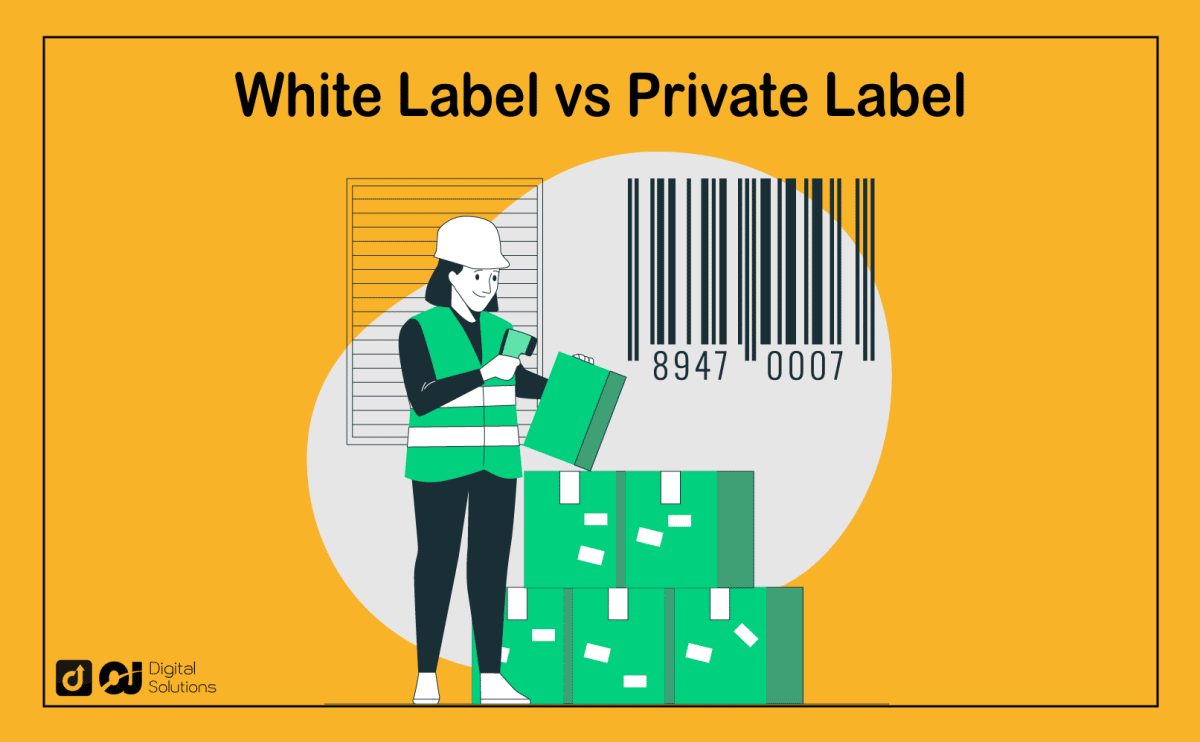Sourcing your products is one of your biggest challenges as an Amazon seller. You’ll have to consider who will supply your products.
One question you can ask yourself is: white label vs private label products? Which is better?
I can help you there.
In my white-label vs. private-label guide, I will discuss the key differences between white labeling and private labeling. I will also provide information to help you decide which one is best for your business.
Let’s begin!
White Label vs. Private Label
There are quite a few differences between a white-label product and a private-label product.
With white labeling, multiple resellers take a generic product to rebrand and sell as their own. Meanwhile, private labeling allows sellers to customize their products better.
Here is a more detailed explanation of so-called private labeling and white labeling.
Private Labeling Definition
Private labeling is when a manufacturer creates an original product from scratch or modifies an existing product using the Amazon seller’s specifications.
An established seller may choose this approach to create a unique product based on their target customer’s preferences. Sellers usually opt for private label products when uniqueness and differentiation are high priorities for customers, like in the beauty and fashion industries.
Imagine a natural hair company getting feedback from customers saying they want conditioners with more slip. The company then develops a new formula to ensure the product has more slip and sends it to a third-party manufacturer to produce it exclusively.
White Labeling Definition
White labeling is when a manufacturer creates generic products for mass production and sells them to different retailers. Sellers who buy products from a white-label manufacturer make minor variations, like adding their branding and packaging.
Unlike private-label products, sellers can’t influence how manufacturers produce white-label products because they are standardized.
With white-label products, the manufacturer creates conditioners with more slip to fulfill the demand of multiple sellers.
Sellers get the same product; each adds their branding and packaging to make the product more unique.
White labeling is a low-cost entry point for new Amazon sellers.
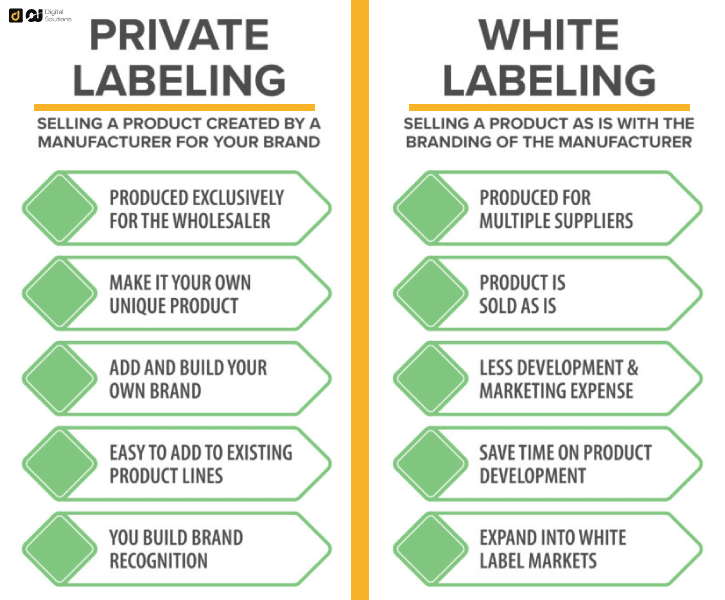
White and Private Labeling Examples
According to Statista, total retail sales for private label products in the U.S reached $5.15 trillion in 2021 and are estimated to hit $5.35 trillion in 2025.
Major retail stores have private-label products:
- Target- Archer Farms
- Walmart- Great Value
- Costco- Kirkland.
Even Amazon has a private-label brand called AmazonBasics. That’s their own brand name selling their own products.
This private-label brand partners with third-party manufacturers in India and China to create private-label goods according to Amazon’s specifications. However, this move led to scrutiny and concerns by third-party sellers and government entities.
White-label products include consumer goods, electronics, pet supplies, food products, and software. For example, Kendo Holdings manufactures cosmetic products for Fenty Beauty, Lip Lab, Marc Jacobs, and Bite Beauty.
Dripshipper is another excellent example of a company that offers white-label products. This white-label provider is ideal if you want to sell coffee but lack connections to source it from Colombia, Kenya, or Ethiopia.
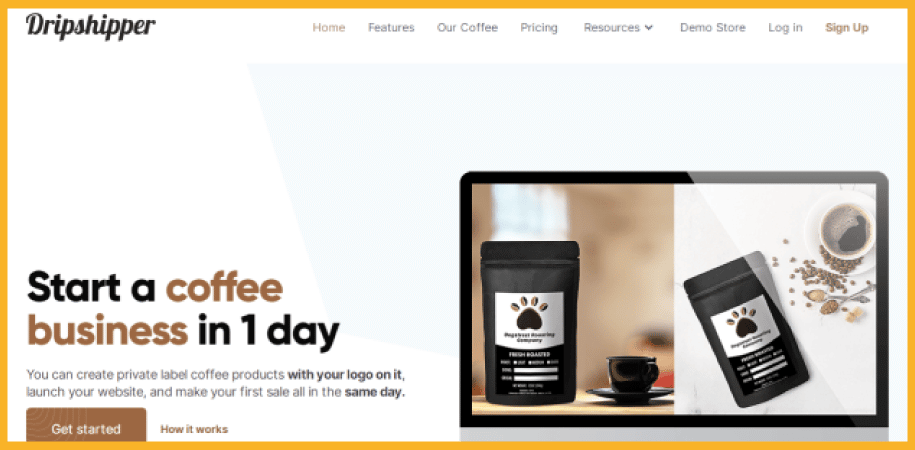
The white-label business model isn’t limited to tangible products.
The credit card processing and SaaS industries also offer white-label services. White-label manufacturers provide credit cards to banks that don’t have an in-house service. Meanwhile, SaaS industries provide scripts or APIs to resellers.
White Label vs. Private Label: The Differences
Let’s settle the private label vs white label debate by examining the key differences between white label and private label companies.
Customization
Private label manufacturing ensures customization because retailers send their product requirements to manufacturers before the production process starts.
The white-label brand allows you to package your product as you see fit once the production process is over.
Exclusivity
A private-label manufacturer creates a product that one retailer will sell exclusively. You have pricing control as the retailer because you offer a unique product.
White labels involve rebranding a manufacturer’s generic product and making it available to many retailers.
The landscape for white-label products is highly competitive and lacks exclusivity, so pricing tends to depend on factors like brand recognition and competition.
Industry
The primary focus of most private label companies is physical products, like household goods, cosmetic products, food products, and beverages.
Private label services are popular in the healthcare industry; they produce generic drugs.
The tech industry also offers white labeling services, especially the Saas industry.
Advertising technology also uses white-label manufacturing.
ROI
A private-label product is more capital-intensive because it involves custom manufacturing.
As the retailer, you’ll need to conduct market research and product development before approaching a private label manufacturer.
Private labeling allows you to develop a unique product that stands out from the competition. It can be more profitable because of the competitive advantage.
On the other hand, white-label products feature lower production costs, making them ideal for multiple retailers.
White Label vs. Private Label: The Similarities
The white label model involves outsourcing the production of goods to third-party manufacturers. The same goes for the private-label model.
Both private and white labeling gives retailers control over their marketing strategy. You have the chance to control your overall brand image and brand name to stand out from competitors.
Furthermore, manufacturers who provide white labeling or private labeling services don’t include their trademarks on the products. Consumers won’t know if a company other than the one on the packaging created the product.
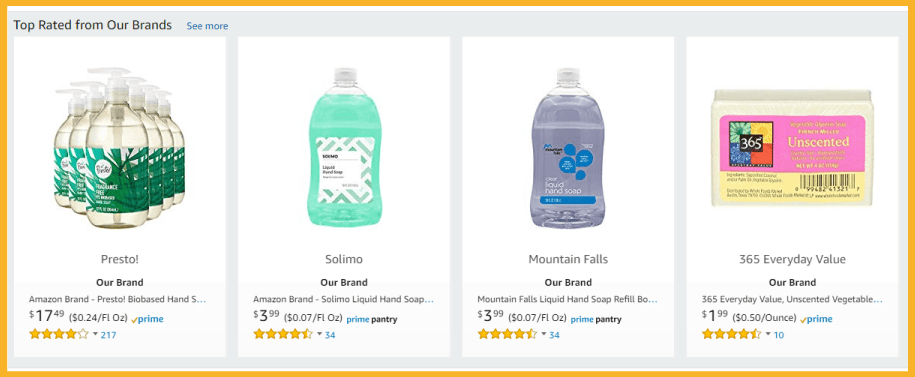
White Label vs. Private Label: Which One to Choose?
Both white labeling and private labeling ensure you don’t have to spend a lot of time on the manufacturing details of a product. The entire product design and creation are left to manufacturing partners, allowing you to focus on other aspects, such as supply chains and marketing efforts.
When Should You Choose Private-Label Products?
The private label business model is ideal if you want to sell a specific product. Private labeling allows you to develop a unique product that ensures exclusivity.
Here are the pros and cons of selling private-label products.
Pros
- You control the product quality and specifications.
- You control pricing because you own the products.
- You can quickly respond to your customer’s needs and preferences
Cons
- It can be challenging to build loyalty when competing with established brands.
- You depend on private-label brands for your products.
When Should You Choose White-Label Products
White labeling is ideal if you don’t have a unique product idea but want to begin selling immediately. If you want to start a business without a high initial investment, white-label products are for you.
White labeling is the way to go if you want to monetize your influencer brand with merch or create branded supplemental products for your business.
Pros
- White-label manufacturing is cheaper because it doesn’t include custom requests.
- You tap into the industry expertise of the manufacturing company.
- White-label products help you start an ecommerce business fast.
- White-label products can boost your brand’s visibility.
Cons
- You can’t control product specifications and features.
- It can be challenging to stand out from other retailers.
- Miscommunication with white-label manufacturers is possible because they’re dealing with other retailers.
White Label vs. Private Label: How to Sell on Amazon
There are two plans for Amazon seller accounts: 1) the Individual Seller plan and 2) the Professional seller plan.
Individual Seller
The Individual Seller plan is free; you only have to pay a 99-cent fee for each item you sell. You also have to pay a 15% consolidated fee. Note that this plan only allows you to sell up to 40 units monthly.
Professional Seller
The Professional Seller plan costs $39.99 monthly (plus referral and other selling fees). This plan is more expensive than the Individual Plan, but you can sell more than 40 units monthly. You can also request approval to sell products in the Restricted category.
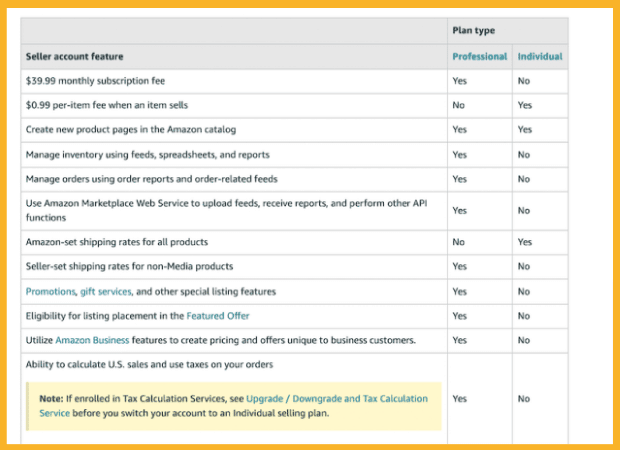
How To Sell Private Label and White Label Products on Amazon
As a third-party seller on Amazon, you might be intimidated to compete with other Amazon retailers. However, dealing with Amazon’s inexpensive versions of your products is just part of the game.
Here is an overview of the criteria you should follow to find the best private-label products to sell on Amazon.
Products with low seasonality
Aim for products with year-round demand because selling seasonal goods limit your cash flow.
Products that are small and light
Amazon has an oversize limit of 18 inches by 14 inches by 8 inches. You’ll incur more in monthly storage fees if you sell oversized products. Your shipping costs will also affect your profit margins when you ship more oversized products.
Products with room for improvement
Don’t limit yourself to selling only one product. Look for products that allow you to expand your offerings.
Products priced between $15-$50
Products that cost less than $15 will eat into your profit margins once Amazon takes its cut. On the other hand, customers tend to buy from established brands if the product’s price is more than $50.
Product research
When researching the product you’d like to sell, leverage these Amazon product research tools.
- Helium 10 – to find related keywords related to your product as well as growth trends.
- Jungle Scout – to determine the number of product reviews, average selling price, and estimated net worth fees.
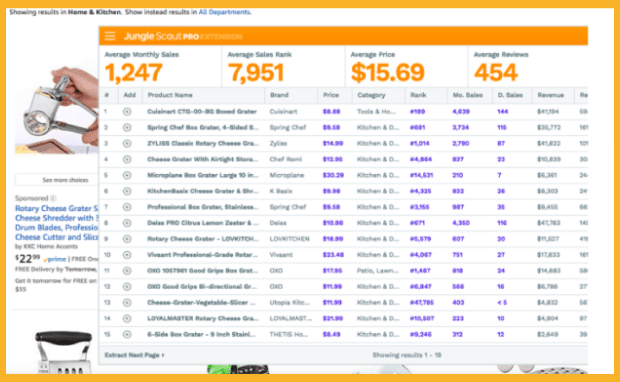
- Keepa – to determine a product’s recent sales volume and price.
- Google Trends – to assess a product’s one-year performance.
You can also use Amazon’s Hot New Releases and Best Sellers sections to select your private label brand.
The Hot New Releases section shows products that have just entered the marketplace and have huge sales volumes.
The Best Sellers section displays the top 100 products in the best-selling list of every category. Unlike the Hot New Releases section, the Best Sellers section shows you products that have been at the top for a more extended period.
When you’ve decided on your product, analyze your competitors and track their performance and sales.
Select your competitors’ top five products and review their product listings. Doing so will help you identify how they use keywords to explain a product. You should also check their customer feedback to identify gaps.
Private-Label Manufacturing
The next step is to find a private label manufacturing company.
JungleScout features a supplier database to help Amazon sellers find legitimate manufacturers. This tool lets you assess manufacturers’ customer volume and shipments.
SaleHoo is another tool that helps you look for manufacturers specializing in particular product niches. You’ll need to pay to access that directory, though.
Alibaba is an excellent source of white-label companies. Ensure you work with vetted gold suppliers because they have passed the onsite check. It’s definitely the most popular among ecom brand owners that sell private label products.
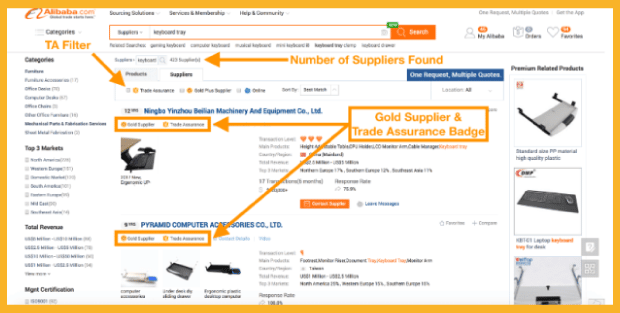
Use the trade assurance program to protect yourself from scams. The program provides a money-back guarantee in case of problems with the manufacturer, such as delays and quality discrepancies.
Amazon FBA
We recommend signing up for Amazon’s FBA program for your private-label brands. Amazon takes care of storage, packaging, shipping, and customer care for FBA sellers. Furthermore, FBA sellers are also eligible for Prime delivery.
The Bottom Line
I hope my guide has given you a clearer picture of the differences between white-label and private-label products. Hopefully, you’ve also decided which product is better for your business.
To further stand out from your competition, optimize your product listings. When selling white-label products, how you promote your Amazon product also matters.

